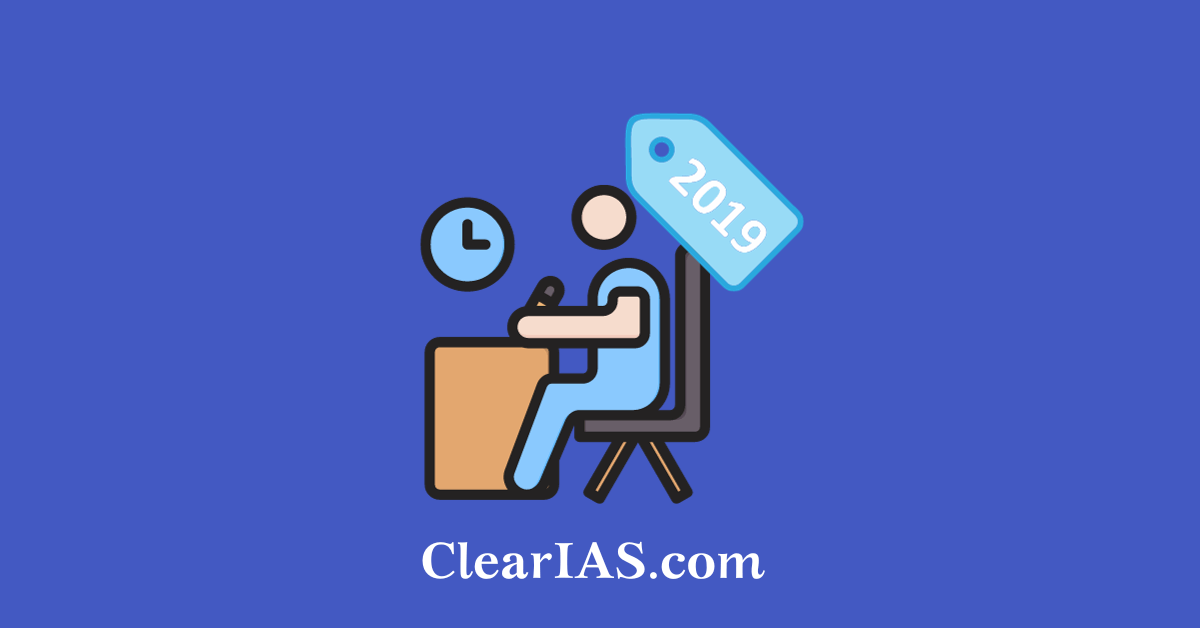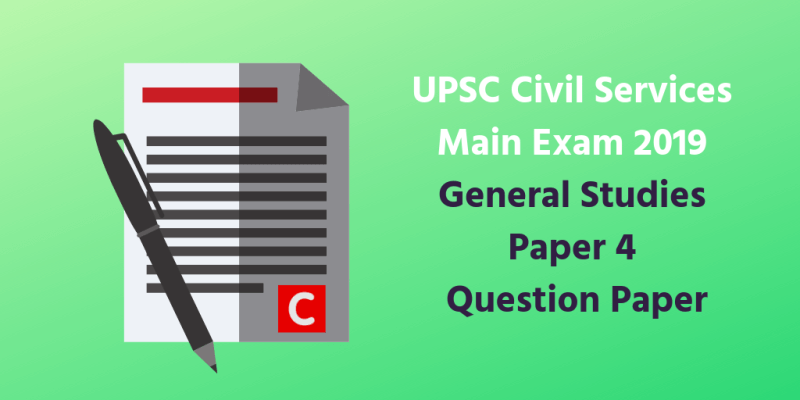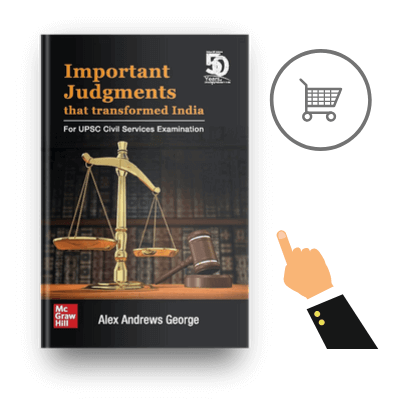 Union Public Service Commission UPSC Mains conducted the General Studies Paper 4 (GS4) Paper, as part of the Civil Services Main Exam 2019 on 22-09-2019. Aspirants can now view or download the General Studies Paper 4 (GS4) Question Paper – more popularly known as ‘Ethics Paper’ from this post.
Union Public Service Commission UPSC Mains conducted the General Studies Paper 4 (GS4) Paper, as part of the Civil Services Main Exam 2019 on 22-09-2019. Aspirants can now view or download the General Studies Paper 4 (GS4) Question Paper – more popularly known as ‘Ethics Paper’ from this post.
GENERAL STUDIES PAPER 4: UPSC Civil Services Mains Examination – 2019
Instructions
- Total Marks: 250 marks, Time duration: 3 hours.
- There are 12 questions divided into two sections and printed both in ENGLISH and HINDI.
- All questions are compulsory.
- The number of marks carried by a question/part is printed against it.
- Answers must be written in the medium authorized in the admission certificate which must be stated clearly on the cover of this question-cum-answer (QCA) booklet in the space provided.
- No marks will be given for answers written in a medium other than an authorized one.
- Keep the word limit indicated in the questions in mind.
- Any page or portion of the page left blank must be struck off clearly.
General Studies Paper 4 (GS4) Questions – UPSC CSE Mains 2019
Section A
1 (a) What are the basic principles of public life? Illustrate any three of these with suitable examples. (150 words). 10
1 (b) What do you understand by the term ‘public servant’? Reflect on the expected role of a public servant. (150 words). 10
2 (a) Effective utilization of public funds is crucial to meet development goals. Critically e examine the reasons for under-utilization and mis-utilization of public funds and their implications. (150 words). 10
2 (b) “Non-performance of duty by a public servant is a form of corruption” Do you agree with this view? Justify your answer (150 words). 10
3 (a) what is meant by constitutional morality? How does one uphold constitutional morality? (150 words). 10
4 (a) Explain the basic principles of the citizens’ charter movement and bring out its importance. (150 words) (10 marks)
4(b) There is a view that the Official Secrets Act is an obstacle to the implementation of the Rights to Information Act. Do you agree with the view? Discuss (150 words) (10 marks)
5 (a) What do you understand by probity in governance? Based on your understanding of the term, suggest measures for ensuring probity in government. (150 words) (10 marks)
5 (b) “Emotional Intelligence is the ability to make your emotions work for you instead of against you.” Do you agree with this view? Discuss. (150 words) (10 marks)
6. What do each of the following quotations mean to you?
(a) “An unexamined life is not worth living.” – Socrates (150 words) (10 marks)
(b) “A man is but the product of his thoughts. What he thinks, he becomes.” – M.K.Gandhi (150 words) (10 marks)
(c) “Where there is righteousness in the heart, there is beauty in the character. When there is beauty in the character, there is harmony in the home. When there is harmony in the home, there is order in the nation. When there is order in the nation, there is peace in the world.” – A.P.J. Abdul Kalam (150 words) (10 marks)
SECTION B: Case studies
Q7. You are heading the rescue operations in an area affected by severe natural calamity, thousands of people are rendered homeless and deprived of food, drinking water, and other basic amenities. Rescue work has been disrupted by heavy rainfall and damaged supply routes. The local people are seeded with anger against the delayed limited rescue operations. When your team reaches the affected area, the people there heckle and even assault some of the team members. One of your team members is even severely injured. Faced with this crisis some team member pleads with you to call off the operations freeing threats to their life.
In such trying circumstances, what will be your response? Examine the qualities of a public servant that will be required to manage the situations. (250 words) (20 marks)
Q8. Honesty and uprightness are the hallmarks of civil servants. Civil servants possessing these qualities are considered the backbone of any strong organization. In the line of duty, they make various decisions, and at times some become bonafide mistakes. As long as such decisions, are not taken intentionally and do not benefit personally, the officer cannot be said to be guilty. However such decisions may, at times, lead to unforeseen adverse consequences in the long term.
In the recent past, a few instances have surfaced wherein civil servants have been implicated for bonafide mistakes. They have often been prosecuted and even imprisoned. These instances have greatly rattled the moral fiber of the civil servants.
How does this trend affect the functioning of civil services? What measures can be taken to ensure that honest civil servants are not implicated for bonafide mistakes on their part? Justify your answer. (250 words) (20 marks)
Q9. An apparel manufacturing company having a large number of women employees was losing sales due to various factors. The company hired a reputed marketing executive, who increased the volume of sales within a short span of time. However, some unconfirmed reports came up regarding his indulgence in sexual harassment at the workplace.
After some time a women employee launched a formal complaint to the management against the marketing executive for sexually harassing her. Faced with the companies’ indifference, in not taking cognizance of her grievances, she lodged an FIR with the police.
Realizing the sensitivity and gravity of the situation, the company called the women employee to negotiate. In that, she was offered a hefty sum of money to withdraw the complaint and the FIR and also to give in writing that the marketing executive was not involved in the case.
Identify the ethical issues involved in this case. What options are available to the women employees? (250 words) (20 marks)
Q10. In a modern democratic polity, there is a concept of the political executive and permanent executive elected people’s representatives form the political executive, and bureaucracy forms the permanent executive. Ministers frame policy decisions and bureaucrats execute these. In the initial decades after independence, the relationship between the permanent executives and the political executives was characterized by mutual understanding, respect, and cooperation, without encroaching upon each other’s domain.
However, in subsequent decades, the situation has changed. There are instances of the political executive insisting upon the permanent executives to follow its agenda. Respect for and appreciation of upright bureaucrats has declined. There is an increasing tendency among the political executive to get involved in routine administrative matters such as transfers, posting, etc. Under this scenario, there is a definitive trend towards the ‘politicization of bureaucracy’. The rising materialism and acquisitiveness in social life have also adversely impacted upon the ethical values of both the permanent executive and the political executive.
What are the consequences of this ‘politicization of bureaucracy? Discuss. (250 words) (20 marks)
Q11. In one of the districts of a frontier state, the narcotics menace has been rampant. This has resulted in money laundering, mushrooming of poppy farming, arms smuggling, and near stalling of education. The system is on the verge of collapse. The situation has been further worsened by unconfirmed reports that local politicians, as well as some senior police officers, are providing surreptitious patronage to the drug mafia. At that point in time a woman police officer, known for her skills in handling such situations is appointed as superintendent of police to bring the situation to normalcy.
If you are the same police officer, identify the various dimensions of the crisis. Based on your understanding, suggest measures to deal with the crisis. (250 words) (20 marks)
Q12. In recent times, there has been an increasing concern in India to develop effective civil service ethics, code of conduct, transparency measures, ethics and integrity systems, and anti-corruption agencies. In view of this, there is a need being felt to focus on three specific areas, which are directly relevant to the problems of internalizing integrity and ethics in the civil services. These are as follows:
1. Anticipating specific threats to ethical standards and integrity in the civil services,
2. Strengthening the ethical competence of civil servants and
3. Developing administrative processes and practices that promote ethical values and integrity in civil services.
Suggest institutional measures to address the above three issues. (250 words) (20 marks)
UPSC CSE General Studies Paper 4 (GS4) Question Paper: Analysis

Many candidates treat ‘General Studies Paper 4’ as an ‘Ethics Paper’. However, the scope of this paper is much wider. UPSC itself mentions this paper as ‘Ethics, Integrity, and Aptitude’, and not just ethics.
It’s an Aptitude-measuring paper!
Through the ClearIAS approach to the Ethics paper in UPSC Mains, we had long before guided aspirants that this paper is more of an aptitude-checking paper rather than an ethics paper. The paper is not just about your ethics, but about your problem-solving skills and attitude in general.
The division of questions
The GS4 Question Paper in UPSC Mains had 12 questions – divided into two sections.
There were 6 case studies (we call them ‘problem-solving questions’), each worth 20 marks, thus contributing 6*20=120 marks.
The remaining 130 marks were also from 6 questions but with sub-questions. In effect, the 10-mark questions were 130 marks (13*10=130 marks).
This was the same pattern last year as well.
Nature of questions
Direct theoretical questions were less in number. UPSC Mains rather focussed on the application of the same in the life, views, and thoughts of a future civil servant.
It’s really nice to see UPSC including highly relevant topics like ‘Constitutional Morality’ in this year’s General Studies Paper 4.
As usual, UPSC gave candidates many quotes and sought their opinion from candidates.
Case studies
Case studies (or problem-solving questions) were not sticking to the ethical dilemma alone. The answer should include other dimensions as well.
A notable question from the case study section was about the consequences of politicization of bureaucracy.
Preparing for UPSC 2020? Don’t miss the new Bestseller!
‘Important Judgments that Transformed India‘ perfectly explains the concepts of the Indian Constitution/Polity/Judiciary, through an excellent compilation of court cases, mind-maps, and tables.
There is a discount of 20% for the early buyers who order it now!
Order your copy now! Hurry!






Please upload the language paper Hindi and compulsory paper English. Optional paper PSIR Paper1 and 2 uploaded as well.🙏🙏🙏🙏🙏🙏